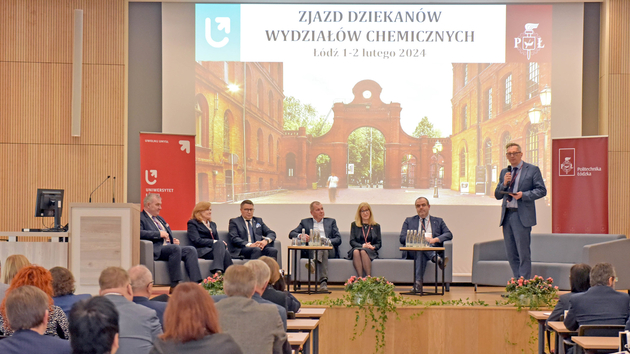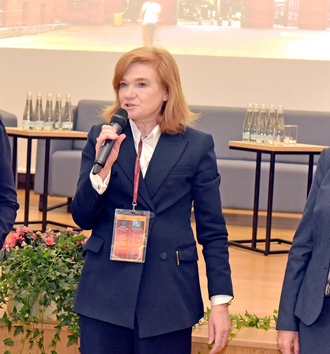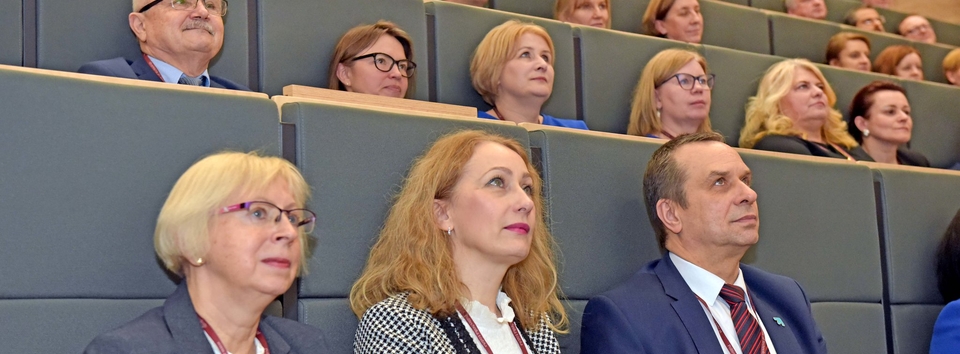During the two days of the Congress – on 1-2 February 2024 – topics important for science and higher education were discussed. Topics related to management, finance, cooperation with the socio-economic environment and education were discussed intensively. Discussions about the evaluation of scientific disciplines, which will be carried out in two years' time, opportunities for staff development and scientific promotions were held.
Prof. dr hab. Elżbieta Żądzińska – Rector of the University of Lodz:
I am proud that our university co-organises such an important meeting, creating a platform for exchanging knowledge and experiences as well as strengthening relationships.
On the first day of guests met in the "Alchemium – the magic of chemistry of tomorrow" building, the seat of the Faculty of Chemistry of the Lodz University of Technology. They were welcomed by Prof. Dr hab. inż. Krzysztof Jóźwik – Rector of the Lodz University of Technology and Prof. Małgorzata Szynkowska-Jóźwik – Dean of the Faculty of Chemistry of Lodz University of Technology and Prof. Sławomira Skrzypek – Dean of the Faculty of Chemistry at the University of Lodz.
The second day of the Congress was hosted by our university. The discussions began with a panel discussion: "Quo vadis szkolnictwo wyższe?" [Quo vadis higher education?] which was attended by:
- Prof. Dr. hab. Elżbieta Żądzińska – Rector of the University of Lodz
- Prof. Dr hab. inż. Krzysztof Jóźwik – Rector of the Lodz University of Technology
- Prof. Teofil Jesionowski – Rector of the Poznan University of Technology, Chairperson of the Conference of Rectors of Polish Technical Universities.
For years meetings of Deans of Chemistry Faculties have been a forum for open, often difficult discussions about new challenges facing universities in a changing world
– comments Prof. Dr hab. Sławomira Skrzypek – Dean of the Faculty of Chemistry at the University of Lodz.
The panel entitled "Umiejętności studenta w szybko zmieniającej się rzeczywistości" [Student's skills in a rapidly changing reality] was devoted to teaching challenges resulting from changes in the labour market and the expectations of young people. The issue of new strategies for promoting science among school youth was also discussed. During the discussion, an answer was sought to the question: "Rekrutacja – co się dzieje?" [Recruitment - what is happening?]
The topic of technology in the area of water, hydrogen and coal, which has been widely discussed in the scientific and business community, was also addressed during the meeting.
This year's event was attended by over 100 deans and vice-deans of chemistry faculties from universities throughout Poland, as well as representatives of the Ministry of Science and Higher Education, the Council for Scientific Excellence, the Polish Accreditation Committee and the Polish Chemical Society. The congress was accompanied by speeches about the Polish Chemical Society and representatives of companies that are leading manufacturers of scientific, research, technological and medical equipment from Poland and France.
More information about the panelists and the course of the Congress of Deans of Chemistry Faculties can be found in the following text about the event.
Source: Lodz University of Technology
Edit: Communications and PR Centre, University of Lodz
Photos: Jacek Szabela, Lodz University of Technology



